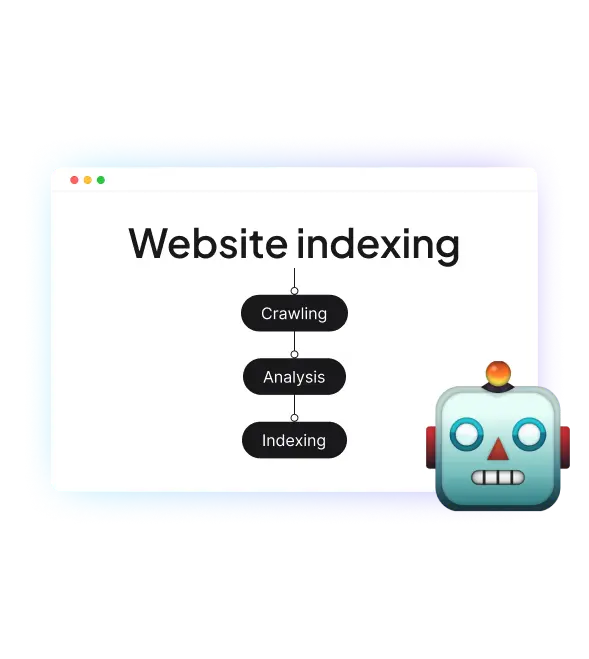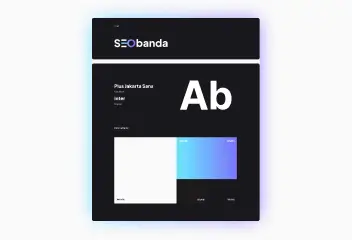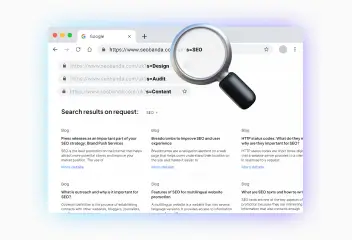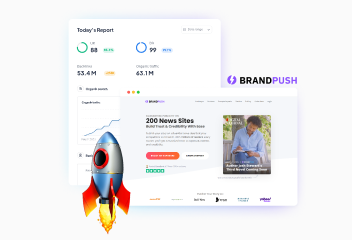What is website indexing and why is it important?
Website indexing is the process by which search engines collect, process, and store information about pages to make them searchable by users. In simple terms, indexing helps to get pages into the search engine database, where they can then be seen by anyone.





How is a website indexed?
The website indexing process consists of three main stages:
- Crawling: Search engines (crawlers or bots) visit websites to gather information about the pages. They follow links from one page to another, collecting data about the content, structure, meta tags, and content.
- Analysis: The collected data is processed to analyze the content of the pages. Search engines evaluate the relevance and quality of the content using keywords, meta tags, images, text, and a very large number of factors.
- : information from the processed pages is added to the search engine index. This allows you to quickly find relevant pages when a user enters a query.

Increase visibility
for your business: SEO solution for growth!


How to make sure your website is indexed?
- Use Google Search Console to track the status of your site’s indexing. This tool shows you which pages are indexed and reports crawl errors. You can also use Search Console to request a page to be indexed if it is not yet online.
- Make sure that your robots.txt file does not block important pages from being crawled by search engines. This is a very important file for SEO, it is used to block unnecessary pages from being indexed, but sometimes mistakes are made and important pages are blocked. To prevent problems, you need to analyze the robots.txt file.
- Create and submit an XML sitemap to search engines. It helps bots that crawl your site from time to time to find all its pages and move freely from one page to another.
- Use the command “site:yourdomen.com” (replace yourdomen.com with the name of your site). This command will show you which pages are indexed on your site.


Problems with indexing: Problems and Solutions

Website indexing is a critical moment for a business’s online presence. Without indexing, a website will not exist on the Internet at all. Let’s take a look at what can cause indexing problems and how to solve them:
Duplicate content
Cause: several pages on the site have the same or very similar content.
Consequences: search engines may consider your site less relevant and authoritative, which lowers its rankings and positions. This can also result in penalties being imposed on the site.
Solution:
- Use canonical tags (rel=”canonical“) to identify the main version of the page.
- Remove or merge duplicate content to make it unique and useful to users.
- Set up proper 301 redirects to merge multiple URLs into one.
Blocked resources
Cause: The robots.txt file or meta tags (noindex) block important pages from being crawled.
Consequences: search engines cannot access and index important pages on your site.
Solution:
- Check your robots.txt file and make sure that important pages are not blocked.
- Use Google Search Console to identify blocked resources.
- Make sure that meta tags (noindex) are used correctly.
Incorrect redirects
Cause: using incorrect redirects (for example, 302 instead of 301).
Consequences: search engines can lose track of some pages, which leads to poor indexing and “falling off” pages.
Solution:
- Use 301 redirects for permanent redirects.
- Check your redirects with tools like Screaming Frog to make sure they are configured correctly.
404 errors
Cause: deletion of pages without setting up redirects or URL errors.
Consequences: search engines won’t be able to find the pages, which lowers your site’s rankings.
Solution:
- Use Google Search Console to detect 404 errors.
- Set up 301 redirects for deleted pages to redirect users to relevant content.
- Check your website regularly for broken links.
Slow website loading speed
Cause: heavy files, not optimized images, slow server.
Consequences: search engines may not have time to crawl all pages of the site, which affects indexing.
Solution:
- Optimize images and use formats that reduce file size (for example, WebP).
- Use caching to reduce server load. Also, choose the right and high-quality hosting.
- Check page load speeds with tools such as Google PageSpeed Insights and take steps to improve performance.
Missing or incorrect XML sitemap
Cause: The site does not have an XML sitemap or has an incorrect structure.
Consequences: search engines may not be able to find some of your site’s pages and therefore not analyze them.
Solution:
- Create an XML sitemap using tools such as Yoast SEO or Screaming Frog.
- Submit the XML sitemap to Google Search Console.
- Update your XML sitemap regularly to make it consistent with your site’s structure.
Lack of internal links
Reason: poor or absent internal link structure.
Consequences: it is more difficult for search bots to “walk” your site and crawl pages.
Solution:
- Create a clear structure of internal links so that search engines can easily navigate between pages.
- Use anchor texts that accurately describe the content of the pages.
- Check your internal link structure with tools like Ahrefs.
Lack of relevant content
Reason: The site is rarely updated or has outdated content.
Consequences: search engines prefer up-to-date and relevant content, so your site’s rankings may be lost.
Solution:
- Update the content on your website regularly.
- Create new posts, articles, blogs, or other types of content.
- Use analytical tools to identify popular content and update it.
A one-stop solution
A one-stop solution to ensure that your pages are always indexed and grow in search results is to contact SEObanda. Our experts will help you maintain your website and its content and attract more targeted traffic.

Increase visibility
for your business: SEO solution for growth!


Conclusion
Website indexing is the process of scanning, processing, and storing information on a website. This process consists of three parts: crawling, analysis, and indexing.
To track website indexing or recommend individual pages for indexing, you should use Google Search Console, which allows you to analyze all the pages that are in the index, send an XML sitemap of the site and perform many other useful actions related to further website indexing.
In order to avoid problems with indexing, it is better to contact the professionals of SEOBanda. They will help you keep your website afloat and improve your organic traffic performance every month.
You may also like it

Brand identity: The key to brand recognition and SEO success
Every product has its own unique feature that sets it apart from other brands. It could be a special font, a unique mascot, or an interesting logo with the right...

What is a dynamic URL and its impact on SEO
A dynamic URL (Uniform Resource Locator) is a web address that changes depending on the user's request or specific parameters. It differs from a static

Press releases as an important part of your SEO strategy: Brand Push Services
SEO is the best promotion on the Internet that helps attract more potential clients and improve your market position. The use of press releases is an important SEO...












